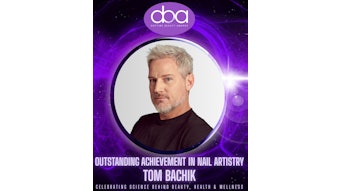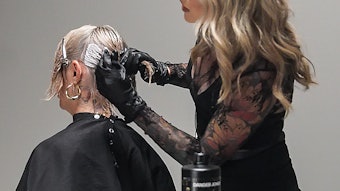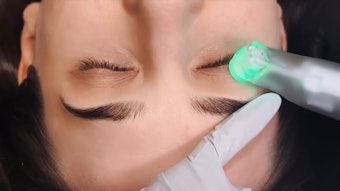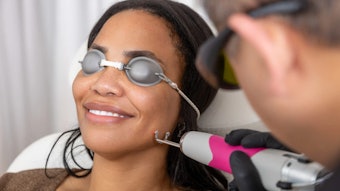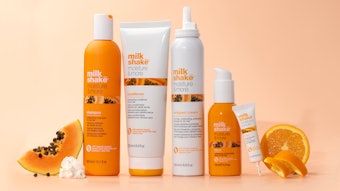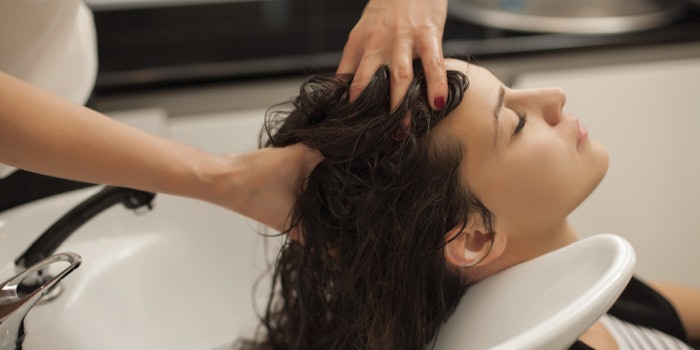
Scalp health searches have been climbing online with many consumers seeking out information on treatments. Scalp health is essential for bountiful hair, but oftentimes, it is unintentionally neglected by clients.
Here, experts share recommendations you can give your clients to ensure they properly care for their scalp.
Tim Abney, Global Vice President of Education for Colorproof
Some signs that your client’s scalp health is not at its best include an itchy, tender or tight scalp; excessive flaking or dandruff; scalp irritation; dryness or, adversely, oiliness; and/or bumps.
There are various reasons why their scalp might not be in optimal health. A few of these include excessive product use, lack of exfoliation or moisturization, inadequate nutrition or hygiene, stress, hormonal imbalances and certain medications as well as medical conditions (including psoriasis or dermatitis). Hard water or mineral buildup can also contribute to scalp buildup and inflammation.
Healthy hair starts with a happy scalp. The best ways to care for scalp are to use a mild shampoo and conditioner designed for the client’s hair type as well as to regularly massage and exfoliate the scalp. If the client’s scalp feels tight or dry, suggest they incorporate a moisturizing oil or serum to help nourish it. Lastly, remind clients that protecting scalp from the sun is always a good idea, especially along their part or hairline. Some quick tips you can give clients to ensure their optimal scalp health include:
1. Keep the scalp clean: While that may sound obvious, it is essential to make sure they’re adequately removing product and mineral buildup, dirt, oils and excess sebum that may be clogging the hair follicle. Advise that they wash their hair regularly with a gentle shampoo and conditioner. Once or twice a week, or as needed, they can use a clarifying shampoo to effectively cleanse while refreshing hair and scalp. Additionally, suggest that they pre-treat the scalp and hair with a pre-shampoo treatment to gently extract minerals and metals commonly found in hard water, well water and pool water.
2. Massage the scalp: Clients can routinely massage their scalp in a circular motion to stimulate blood flow and increase circulation. They can even use a scalp brush, which is much more effective than fingertips alone; not only does it feel amazing, but it works to exfoliate and stimulate the scalp.
3. Eat a healthy diet: A balanced diet rich in protein, iron and vitamins can help maintain a healthy scalp. Clients can check with their doctor or nutritionist to see if they need to adjust their diet.
4. Avoid tight hairstyles: Tight hairstyles that pull on the scalp and hair shaft can cause damage and breakage over time.
5. Reduce stress: Easier said than done, but studies show that reducing stress can significantly help prevent hair loss. Recommend that clients manage stress with meditation, exercise, self-care rituals or other activities.
6. Avoid sleeping with wet hair: Damp or moist environments can cause bacterial and fungal infections. Not only is wet hair more fragile and prone to breakage–it can also contribute to poor scalp health. If clients prefer to wash their hair before bed, suggest they blow-dry the root area to protect their scalp.
Jordan Kindel, Truss Professional Brand Specialist
Most common signs of an unhealthy scalp include dryness, itchiness, oiliness and flaking. An unhealthy scalp is caused by many different factors: anything from stress, underlying disease, diet, illness, or the most common factor, which is overusing hair products.
To avoid buildup and promote a healthy scalp routine, tell clients to begin with using the right professional shampoo, as prescribed by you. If they’re currently battling a dry scalp, advise they avoid shampoos that contain parabens, sulfates and sodium chloride. If clients have an oily scalp, they may want to avoid using products that contain artificial chemicals (ex. synthetic fragrances).
Missy Peterson, Malibu C Senior Global Educator
There are many signs that show when the scalp is not in balance. Some of the most common would be itching, flaking, excessive shedding, or if the hair just isn’t growing.
Some tips for caring for the scalp include:
1. Have clients schedule a full in-salon detox service when they come in, and recommend they maintain their scalp at home with a weekly scalp therapy treatment.
2. Remind clients not to use extremely hot water on the scalp when showering.
3. Recommend a shower filter head. The filter will not remove all of the minerals that can cause scalp issues, but it will reduce them.
Paula Peralta, Paul Mitchell Artistic Director
Excessive product buildup and change in weather, hormones or lifestyle are some of the reasons why an individual’s scalp health may not be at its best. Scalp detoxing is one of the best ways to clarify, soothe and reset your client’s scalp health. A detox rinse goes beyond the normal cleansing routine and can gently clear away product buildup, dirt and dead skin to clarify the hair and scalp, bringing dull locks back to life. Choosing scalp-soothing products that don’t just clean the hair and scalp, but also nourish them, are key.
Scalp Therapies
When you notice symptoms of improper scalp health, it can be difficult to determine which products are best to help clients get back on the right track. Don’t worry! These saviors tend to ailing scalp.
Colorproof Texture Charge Defining Finishing Spray‘s formula features a proprietary blend of polymers and white nettle that allows particles to adhere to individual hair fibers to absorb excess oils while creating a charge that boosts body and texture. @colorproofhair
Truss Professional Therapy Shampoo is recommended as a treatment for scalp disorders. Tonic stimulates follicles, staving off dandruff and hair loss by gently cleansing and refreshing the scalp. @trussprofessional
Malibu C Head Lab Intro Kit features products with scalp-centric formulas that remove mineral buildup and other impurities. @malibucpro
Tea Tree Special Detox Kombucha Rinse purifies the scalp with a gentle exfoliating rinse that clears away product buildup, dirt and dead skin. @teatreehaircare





